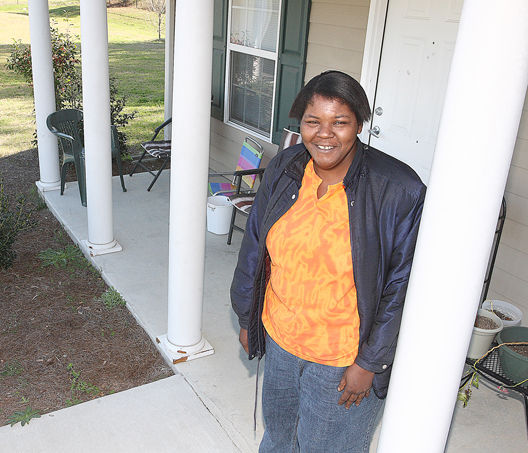Helping moms fight addictions
Published 10:45 pm Friday, January 23, 2009

- Telesha Thomas on the front porch of the two-bedroom duplex she shares with her daughter on the Pines Family Campus in Valdosta.
VALDOSTA — Telesha Thomas said her problems started gradually, imperceptibly. There was no magic moment at which she realized she had a problem with alcohol.
“For a long time, I didn’t think I had a problem. It took a while to realize it,” she said.
Thomas said that life has been a lot better since entering the Pines Family Campus. The 37-year-old said February will make a year she has been at the residential facility for people with alcohol and drug addiction problems and their families.
The only girl in a family with three siblings, Thomas said she didn’t have to share with her brothers.
“When I got something, it was mine. My brothers didn’t play with it, and so I was used to having my way,” she said.
She said she has now learned that her problems “had a lot to do with being selfish and self-centered and thinking the world revolved around me.”
“I did something one day and realized it was real selfish,” she admitted.
Thomas said that she could not let go of things that happened in the past. They played over and over in her mind like a recording.
“I felt depressed and turned to alcohol,” she said.
She sought help and found it at the Pines Family Campus.
Funded through the Department of Human Resource’ Division of Addictive Diseases and the Department of Community Affairs, the Pines Family Campus at 305 Smith Ave., off Madison Highway, is fairly new.
Completed in 2006, the campus consists of nine two-bedroom apartments and 19 three-bedroom apartments in low-density duplexes surrounded by a rolling grassy lawn and connected by clean, broad streets. The main hub of activity is the 4,600-square-foot supportive services building.
With security fencing and a controlled access entry, evening security from 5 p.m. -8 a.m., a playground and large playing field, washer and dryer hookups, ceiling fans, dishwashers and disposals, the campus could be described as being amenities rich.
“The Pines (Family Campus) provides the opportunity for low income women to regain control of their lives, for families to be reunified, and facilitates the training necessary for long-term recovery and successful re-entry into mainstream living,” stated George Bennett, the prime mover behind the project.
A program of Volunteers of America, the Pines Family Campus employs eight permanent staff members, including two substance abuse technicians, a case manager, a clinical coordinator, a marriage and family therapist, a nurse, and a secretary. Elizabeth Harbin is the program director. The Pines Family Campus also contracts with a local doctor, Harbin stated.
“If substance abuse is a barrier, the Pines (Family Campus) helps with that by bringing them into treatment, helping them get stable, and then employable,” Harbin stated.
Pines Family Campus staff members also assist women in clearing other barriers, like probation and Division of Family and Children Services cases initiated prior to entering the program, Harbin said.
The program was originally intended to serve clients eligible for Temporary Assistance to Needy Families, but before the facility could get up and running, TANF funding was no longer available, creating financial gaps for program participants, Harbin stated.
“None of the women receiving treatment at the Pines (Family Campus) has ever received any TANF funds,” Harbin said.
One big advantage of the program is that children remain with their mothers, Harbin stated. The campus includes a 2,700-square-foot childcare facility, but there is no TANF funding to operate it. Harbin said it will take $30,000 to open the daycare facility.
Women attending groups to learn skills and change unhealthy behavior patterns must bring their children with them, which can become a big distraction.
“In groups, the kids get agitated, make a lot of fuss and disrupt the groups, so it’s hard to focus,” Thomas said.
Most of the children staying with their mothers at the Pines Family Campus are around 3 or 4 years old, Thomas said, the exception being her 16-year-old daughter Jamesha.
Treatment groups meet Monday through Friday from 9 a.m.-4 p.m., and include such classes as daily living skills, dual diagnoses, parenting, ready for work, substance abuse education and training, anger management and conflict resolution, among others.
Thomas said, “Alcohol is just a symptom of a problem, but there’s other problems too that, if I don’t work on them, will lead me back to alcohol.” She said her living skills group has helped her deal with “the shame and guilt I felt from being out there in an active addiction.” Now, she wakes up each morning “with peace of mind and a positive attitude.”
Thomas said that she loves to read “anything that will hold my attention. If I read the first two or three pages and it doesn’t grab my attention, I won’t finish it.”
Individuals wishing to receive Pines Family Campus services must undergo a clinical assessment prior to being accepted into the program. The only thing clients are responsible for is a $100 housing deposit and getting the electricity to their unit turned on, Harbin said. Once in treatment, rent is free until they are able to start working, at which time rent payments are based on income.
State budget cuts are a concern, Harbin said, but a bigger concern is having general funds for client needs, like personal hygiene items, diapers, medication, and electric bills.
“These women need help now,” Harbin said. “Due to the nature of the women coming into the Pines (Family Campus), many of them lack the financial resources to make treatment possible. Most of the women have burned all family bridges, are unable to receive assistance from other state agencies and are left to fend for themselves.
“This month the Lowndes Mental Health Association has graciously agreed to assist the Pines with diapers, one of our most urgent needs,” Harbin added.
Thomas has completed the coursework for her training as a Certified Nurse’s Aide and just has to complete the state certification tests to be employable in the field. She said she likes working with Alzheimer’s patients because “they need a lot of love. My heart goes out to them.”
She said she would also like to work as a substance abuse counselor at some point.
Doris McGee, a substance abuse technician at the Pines Family Campus, has been counseling Thomas and helping her look for work.
“This place is a blessing for women struggling with substance abuse. It’s a privilege to work here and be part of something bigger than I am that is working for good,” McGee said.
“One thing I have run across a lot is that women come here with their heads down and have a shameful look. I encourage them to hold their heads up and look at this as a good thing. To admit you have a problem and want help is a good thing.”
Thomas said McGee has helped her a lot.
“She knows from experience how an addict’s mind works. You can’t pull the wool over her eyes, and she don’t sugar coat nothing,” she said.
Asked if she had any words of encouragement for people trying to overcome substance abuse, Thomas said, “You have to really want it. You can’t just say you’re going to stop and stop. You have to put forth the effort and do the work. If you want the reward, you have to work for it.”
For more information about the Pines Family Campus, please call (229) 245-8045 ext. 2373.





